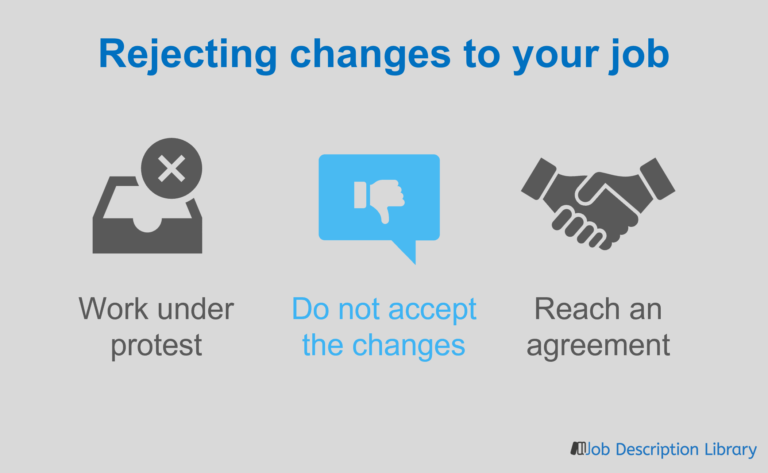If your employer has made changes to your job description or contract, you may be wondering if they are legally allowed to do so, especially if they have done so without consulting you.
Your job description forms part of a legally binding contract between you and your employer, so it cannot be changed drastically without your consent. However, most employment contracts do allow for small reasonable changes.
This guide will help you to understand whether or not your employer can change your job description, based on your contract details, and the changes being made.
Contents
Why do employers make changes to job descriptions?
Companies often go through structural changes, market fluctuations, and mergers: during these periods, they might need to change your job description to better reflect your new responsibilities or your pay or adjust your working hours. There are several instances where your employer might wish to change your job description:

Company restructures
If your company is undergoing some restructuring, it’s not impossible that your job description might change. During financial difficulty, companies may restructure to cut costs or overheads, while others may do so as a means of simply changing strategy. In this case, you might find that your employer modifies your job description to better reflect the newly re-structured company.
Economic/market changes
The corporate world can be unstable and even volatile, with markets fluctuating and causing economic instability for many businesses. If there is increased or frequent market instability, your employer might change your job description. This might mean that you’re employed for fewer hours, or that your bonus or overtime rates change as your employer attempts to withstand an episode of economic turbulence.
Company mergers and acquisitions
If your company or employer has recently been taken over or merged with another company, you might find that your job description changes to better reflect your new role within the merger. In this instance, you might find yourself with increased or fewer responsibilities, as the dynamic of your former workplace changes and assimilates new staff and departments.
What types of changes can be made?
A change to your job description doesn’t just mean a change to your job title: a change in job description can impact your income, your responsibilities within the company, and how many hours per week you are entitled to work.


Responsibilities
A change in job description might mean that you have more or fewer responsibilities going forward in your role, and depending on the reasons for this change, this can be a negative or positive development for your career. Your new job description might mean that you have more day-to-day responsibilities in the workplace, in which case you are within your right to ask for an increase in your salary or hourly wage. Equally, a change in job description can mean that your responsibilities decrease (for example, if a department that you oversaw was liquidated, or a large contract that you managed was annulled.) In this case, you’re within your right to demand a pay freeze (instead of a pay decrease.)
Pay
Just like an employer can change your job responsibilities, they can also unfortunately change your pay. This can happen for a number of reasons: if your company is in financial trouble, you might find that your pay changes slightly (for example, a decrease in your rate of commission, bonus pay, or overtime pay) or you might be offered a standard pay cut in order to help the company stay afloat during a period of instability, and to avoid redundancies. While your employer can offer a change to your pay in order to adapt to a changing or fluctuating economy, you are in no way obliged to accept this change. I’ll explain further on in this article what you need to do if your employer changes your pay.
Hours
Along with pay and duties, your employer can also change your working hours. A decrease to your working hours is often due to financial difficulty, a decrease in clients or customers, or rising overhead costs. However, your employer can also wish to change your job description by increasing your hours, such as switching from a part-time contract to a full-time contract. However, if your employer wishes to change your hours, you should first be consulted and given the opportunity to discuss and negotiate before accepting the proposed changes.
When can employers make changes to your job description?
There are a number of clauses which may be included in your original job contract, and these clauses can enable your employer to make various changes to your job description. It’s always a good idea to keep a copy of your initial employment contract as a point of reference:
Variation clauses
Many employers will use a “variation clause” (or a “flexibility clause”) to make changes to your job description, duties, hours, or pay. A variation clause is often included in your initial employment contract and indicates that the contract can be reasonably adapted if there is a justified reason for doing so. If there is such a clause in your contract then your employer may have grounds to make slight changes to your job description, but within reason. It’s worth checking your contract and checking the exact wording around any clauses.
Mobility clauses
A mobility clause can be included in an employment contract and enables the employer to relocate their employees. This clause must be in the initial employment contract and cannot be added to a contract at a later date without the approval of the employee. However, if your initial contract of employment contains a mobility clause, the employer can invoke it to relocate their employees where necessary. Whether the relocation is permanent or temporary will depend on the initial contract agreement.
What should employers do when making changes to a job description?
Employers making changes to any job description should go through a couple of steps to ensure that their employee(s) are aware of the coming changes and what the change means for their income, job responsibilities and job security. Managers or HR teams should take the following steps when making changes to a job description:
Give notice and consult
The first thing an employer should do is give advanced notice of any upcoming changes to your job description, ideally before said changes have been implemented. Your employer should also preferably consult with you beforehand to discuss options, especially when it comes to increased responsibilities or a potential decrease in pay. Consulting the employee gives them time to prepare for any financial changes or voice any concerns about their new role within the company.
Offer compensation
An employer should offer financial compensation in the form of a salary increase if the responsibilities tied to your job description increase or become more complex with the updated changes. You can also request extra training if you’re unfamiliar with the tasks you’ve been asked to complete. In the event of decreased pay or working hours, an employer should also provide a compensation package to cover any lost income or work.
What to do if you do not accept the changes
Changes to your job description can impact your income, your ability to pay your monthly bills, and even your mortgage. If you decide that the proposed changes will leave you worse off, or if you’re simply unhappy with the new responsibilities or pay agreements, there are several options available for you to take:
Tell them you are “working under protest”
If you’re unhappy with the proposed changes, you can let your employer know that you are working under protest. This a legal term which means that you will continue working in your current role but are unhappy with the proposed arrangement, and will seek to find an alternative solution or agreement. It’s essential that you tell your employer you are doing this as soon as you’re informed about the potential changes.
Tell them you do not accept the change
If you don’t accept the proposed changes, it’s important to let your employer know immediately. If the changes to your contract were made or proposed without advanced warning or with zero compensation, you are well within your right to refuse the updated contract. Let your employer know via email so that there is a written record of your complaint that you may need to use further down the line.
Try to reach an agreement
The best solution is to negotiate with your employer to find an agreement that suits both of you. You could propose completing other tasks or splitting responsibilities with other workers, but it’s important to try to reach an agreement quickly. Even if you’re working under protest, continuing working could legally be interpreted as an acceptance of your new contract. If no agreement is made, you have the option of taking your case to an employment tribunal or taking legal action against your employer for a “breach of contract.” Always seek legal advice before taking any such action against an employer.



